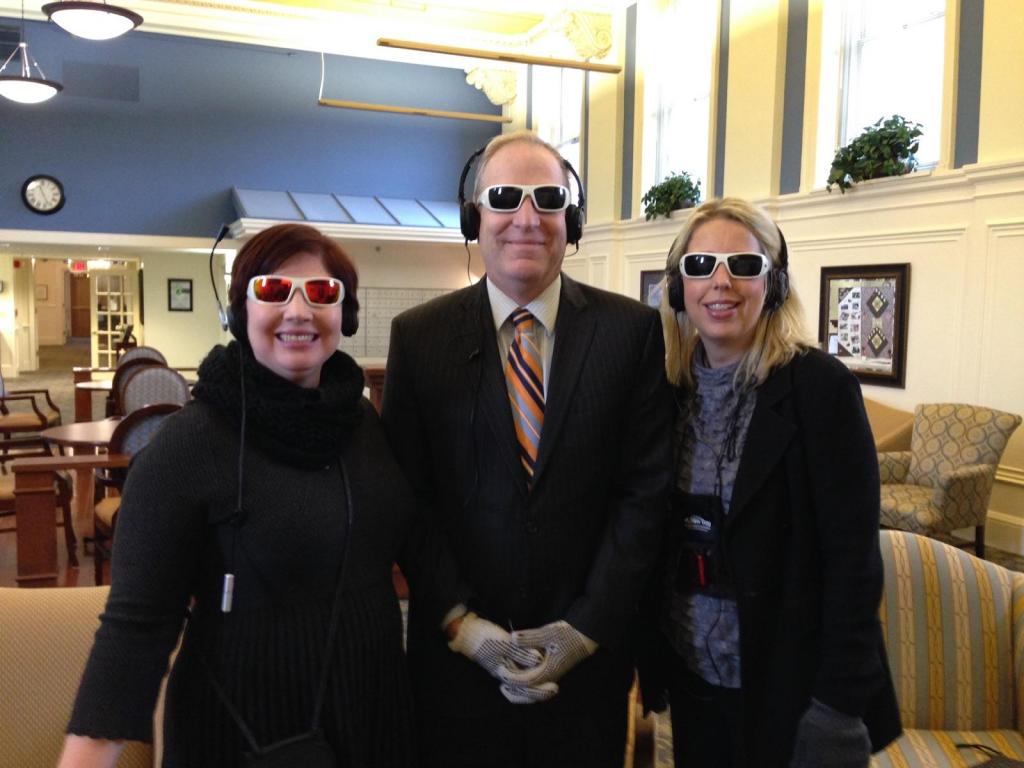
Memory loss, impaired reasoning, personality changes, deteriorating motor skills.
We think we understand these words that define these symptoms of dementia. We sympathize, but do we really empathize?
It's hard to understand when someone you love, be it a parent, partner,or child is no longer themselves.
It's confusing, scary, frustrating, saddening,and maddening to deal with as a caregiver. It drains you emotionally and physically. It takes up most of your energy, if not all.
Now imagine what it's like to be the person with dementia.
I think it's safe to say that most of us are under the impression that a person living with dementia doesn't really know what's going on. But, as we recently learned, they are just as (if not more) confused, scared, frustrated, and sad as the caregiver. Although cognitively impaired, people living with dementia still feel and have feelings.
The Virtual Dementia Tour:
On November 10, 2015, three of our Associates had the opportunity to experience first hand what it's like to go through life with symptoms of dementia. Atria Senior Living in West Hartford CT hosted a Virtual Dementia Tour facilitated by Jenna Sweet with Second Wind Dreams.
To simulate the sensory loss that comes with aging and dementia, each participant was given the following:
- Shoe inserts that were described by one participant as an "upside down carpet protector with the little pellets sticking into your feet." This was supposed to mimic the feeling of arthritis
- Gloves to deaden the sense the touch at the fingertips
- Glasses that blocked peripheral vision as vision narrows with age and were distorted to give a sense of what it is like to have glaucoma
- Headphones with lots of voices talking, but without clear words to understand interrupted by sudden loud noises such as doors slamming or sirens going off
Once properly geared with glasses, gloves, shoe inserts and headphones, the participant was brought into a room and instructed to carry out 5 tasks.
Keep in mind that instruction were given with the distracting sounds from the headphone on and all five instructions were given at once, putting the onus on the participant to listen, understand, and remember what was said.
Here in their own words are the experiences of each Beekley Medical participant:
Melissa Vibberts, Senior Product Manager , Elequil® aromatabs - "My tasks were to fold clothes on a table, put on a sweater. set the table, draw a picture of my family, and pick the 8 of hearts (I think) from a deck of cards. My feet hurt, my stomach was queasy, and it was sensory overload. It really made you understand the reality of someone living with dementia, and more importantly, the feelings - the feeling of feeling alone because I could not make out the voices, the tired feeling because I was overcompensating because my eyes were impaired, the feeling of being vulnerable."
Richard Foster, Senior Training Manager - " I had to draw a picture of my family and label all my members, find the deck of cards and pull the ace of hearts out, find the pants and thread the belt through the loops, clear the table, put on a tie and tie it. The noise in the headset was the most distracting thing for me, I had trouble remembering the tasks. The other stimuli just made everything physically tough - like the gloves, they impacted your fine motor skills."
Laura A. Smith, Senior Account Manager, Elequil aromatabs- " I was given the tasks of folding only the white towels, read page 175 of a book (I could not even see the page, let alone read it), draw a picture of my family, and re-lace a pair of sneakers. Our experience lasted only 5 minutes compared to days, months, and years for many dementia patients. Other than the reading part, which really bothered me as I am a huge reader, I was able to perform my tasks to some level of satisfactory. I cannot, however, imaging living it day after day. The voices, loud noises, and sirens were very unsettling."
Understanding and Quality of Life
All participants agreed that they came away with a much deeper, more empathetic, understanding of the challenges faced by people that have dementia and how easy it can be to become anxious,agitated, and frustrated by what we would consider simple tasks or the business of everyday living.
We applaud the efforts of the long term care centers, such as Atria, that provide the public with learning opportunities to better understand what our loved ones may be feeling and that are working on ways to improve the quality of life for their memory-impaired residents. Many long term care centers with memory care neighborhoods are have implemented or are looking at alternate therapies, such as aromatherapy,music,pet, and art to help engage, soothe, and calm residents to help reduce behavioral incidents and reliance on pharmacological intervention.

Mary Lang
Director of Marketing Communications


